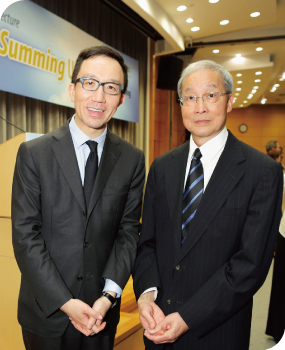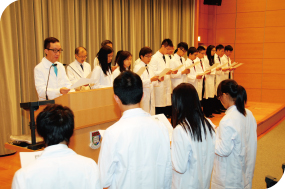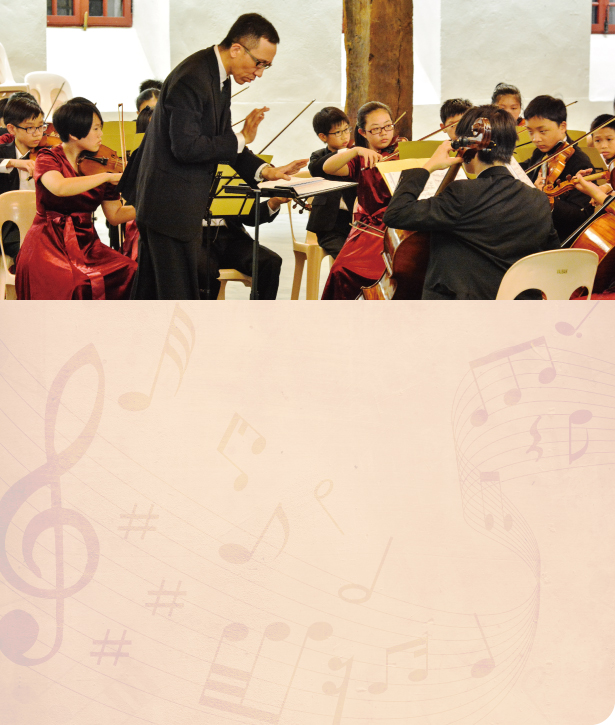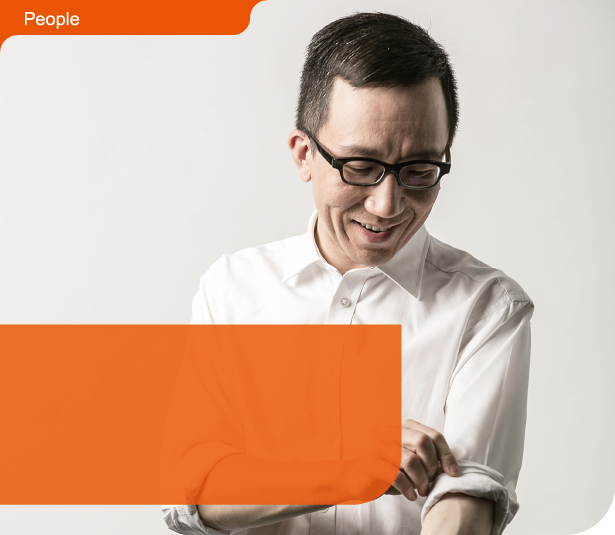The Faculty of Medicine has been extremely busy in recent years, embracing new research technology, developing new hospitals, and diversifying its range of healthcare programmes. Many of these changes were inspired by Professor Lee Sum-ping, who stepped down this summer as Dean of Medicine. But while the Faculty is recognised as one of the best in Asia and the world, its ambitious work is far from realised.
 Dean of Medicine Professor Gabriel Leung (left) at the Farewell Lecture by Professor Lee Sum-ping, former Dean of Medicine (right).
Dean of Medicine Professor Gabriel Leung (left) at the Farewell Lecture by Professor Lee Sum-ping, former Dean of Medicine (right).
The new Dean, Professor Gabriel Leung, who first joined HKU in 1999 and has also been Under Secretary for Food and Health in the Hong Kong Government, as well as Director of the Chief Executive’s Office, is clear about his role.
“This is a time of consolidation and execution, that is of transactional leadership. The focus is on the details and making sure we consistently achieve the highest standards. It is important to have vision and principles, but to deliver on them is even more critical,” he said.
He has already tightened up his management team and identified key goals in each of the Faculty’s main areas of work, which will be refined at ‘town hall’ meetings this autumn with staff, students and alumni.
Technological innovations
On education, the heart of the Faculty’s work, Professor Leung sees two areas of opportunity. First is to keep the walls down and continue tapping into the collaborative possibilities of having medicine, nursing, Chinese medicine, pharmacy and public health under one roof.
 Professor Leung (left) welcomes freshmen in the Medical Faculty’s White Coat Ceremony in early September
Professor Leung (left) welcomes freshmen in the Medical Faculty’s White Coat Ceremony in early September
Second is to venture into massive open online courses (MOOCs), which promise a new era of learning. HKU has joined edX, a joint effort by 28 leading universities including Harvard and Massachusetts Institute of Technology (MIT) to expand access to education to anyone with an internet link. Professor Leung has volunteered to lead the way by teaching one of the four foundational MOOCs at HKU, on multidisciplinary aspects of infectious disease control.
On research, the Faculty has notched up many successes in securing funds and producing world-class outputs. But here, too, technology is changing things.
“Every successful researcher will tell you they are constantly running out of laboratory space. That’s a positive thing. With newer technologies coming on stream, we need to continuously upgrade our equipment and invest in large infrastructure projects that will become a set of platform technologies. On that front we have a specific Assistant Dean portfolio dedicated solely to platform technologies.
“I see the role of Faculty leadership not as one of directing research but of providing the right environment and cultivating an atmosphere that encourages innovation and freedom of enquiry.”
Achieving these research and teaching goals means having the right people in place. An entirely new Associate Deanship will be tasked with attending to ‘human capital’ to focus on recruiting and retaining the best talent. This includes students as well as staff, and attending to student affairs and welfare needs.
If one phrase sums up my thoughts on what we should ultimately do as students and faculty, we must ‘dare to err’.
Professor Gabriel LeungNew hospitals, and a ‘powerful hub’
Finally, the area where there will be the most visible change is clinical services. There are three projects. The HKU-Shenzhen Hospital opened last year, but it will take some time before its 2,000 beds are fully commissioned. Gleneagles Hong Kong Hospital, a tripartite partnership with the private sector in Wong Chuk Hang, has just been given the green light. Its target completion date is 2016–2017 and much effort will be devoted to ensuring the facility is fit for purpose.
And Queen Mary Hospital and other facilities along Sassoon Road are being modernised. Professor Leung sees this as much more than a simple building project.
“We want to make it a contiguous, cohesive whole in terms of planning so all of Sassoon Road will become a powerful hub where basic science laboratories sit alongside the most intensively cared beds in the world, and translational science is practised daily.
“We have the individual pieces of the puzzle, now we have to bring it all together. It will be a symbolic climax for the Faculty’s 130ᵗʰ anniversary in 2017,” he said.
The pace of work will be breathless and Professor Leung anticipates bumps along the way. But that’s okay because, he says, it’s the only way to make progress.
“If one phrase sums up my thoughts on what we should ultimately do as students and faculty, we must ‘dare to err’. Unless you aren’t afraid of making mistakes, you will not really innovate, and universities are the ideal place to trial, fail and eventually succeed.”■
A renaissance man
Professor Leung is a high-flyer: an accomplished scholar, administrator and musician, former senior official in the Hong Kong Government, adviser to national and international agencies such as the World Health Organization and World Bank, and College Master, who continues to practise medicine and teach. And he only just turned 41 this year.
Music is his great passion. He began learning piano at age four, joined the Hong Kong Children’s Choir then Yip’s Children’s Choir as a boy soprano, picked up percussion, the pipe organ and orchestral conducting, and minored in music during his undergraduate years in Canada. As a doctor in Ontario and then master’s degree student at Harvard he continued to perform, and he kept up the pace after returning to Hong Kong in 1999. He still plays piano regularly as a chamber musician and is guest conductor with the Hong Kong Children’s Symphony Orchestra, which he led on tour to Italy and France this summer.
Professor Leung can achieve so much because he’s a master of time management who knows his priorities. He has even taken on more by volunteering to teach the Faculty’s first massive open online course as part of the University’s initial foray into edX. The extra demand on his time doesn’t worry him. “I’m a teacher after all. To doctor is to teach,” he said.



